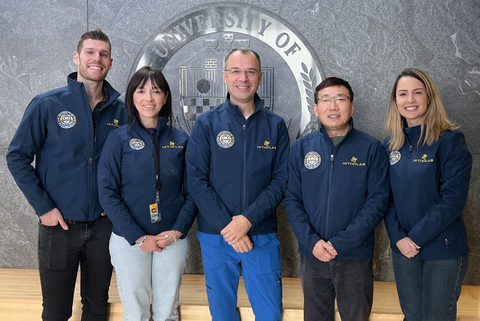
KENNEDY SPACE CENTER, Fla.– RevBio, Inc., announced that an experiment to study Tetranite®, the company’s regenerative bone adhesive biomaterial, has successfully been initiated onboard the International Space Station (ISS). On Saturday, November 26, 2022, the study materials were launched to the space station on SpaceX’s 26th Commercial Resupply Services (SpaceX CRS-26) mission, sponsored by the ISS National Laboratory. This in vivo research, which will be conducted over the next two months on the ISS, will examine the biomaterial’s ability to regenerate bone when used in a microgravity environment where bone growing conditions and the ability to regenerate new bone tissue is significantly compromised.
Brian Hess, co-inventor of the material and CEO of RevBio said, “This experiment is one of a kind, and will showcase the full potential of this breakthrough technology. The results will both validate and motivate our continued research efforts to commercialize products across several indications aimed at revolutionizing treatment options for patients with osteoporosis who suffer from debilitating fractures and have a poor prognosis for recovery.”
Giuseppe Intini, DDS, PhD, Associate Professor of Periodontics and Preventive Dentistry at the University of Pittsburgh, and faculty member at the McGowan Institute for Regenerative Medicine, has designed the experiment and will oversee its execution. He is supported by his laboratory staff, including Roberta Di Carlo, PhD, a postdoctoral associate who has worked closely with the RevBio team, as well as the ISSNL staff and personnel, RevBio, and the ISS National Lab Implementation Partner, Leidos Innovations Corporation.
This research builds upon a prior in vitro experiment the company conducted on the ISS which measured the biocompatibility and proliferation of osteoblast cells in the presence of Tetranite. Osteoblast cells are responsible for producing new bone in the body. When the company participated in the MassChallenge startup accelerator program, it was awarded a grant for this initial project through the Technology in Space Prize, funded by Boeing and the Center for the Advancement of Science in Space, Inc. (CASIS), which manages the ISS National Lab. In this new in vivo experiment, the bone healing process will be examined in live rodents using a calvarial defect model. A side-by-side experiment will be conducted on Earth to examine the differences between healing under both normal and osteoporotic conditions induced by the micro-gravity environment of outer space. By early 2023, additional ISS resupply missions are expected to have returned all of the experimental samples back to Earth where commuted tomography, tissue histology, and gene expression analyses will be conducted to evaluate bone regeneration. Dr. Intini and RevBio are expected to publish the complete results of the experiment by the end of next year.
The research will have a direct impact on RevBio’s commercialization efforts in developing a suite of products to treat bone fractures and defects. In addition to funding for these space-based experiments, RevBio has received considerable grant funding from the National Institute on Aging (2R44AG060881, 1R43AG079741), the National Institute of Neurological Disorders and Stroke (1R44NS115386), and a subaward from the Michigan-Pittsburgh-Wyss Regenerative Medicine Resource Center, funded by the National Institute of Dental and Craniofacial Research (U24-DE029462).

